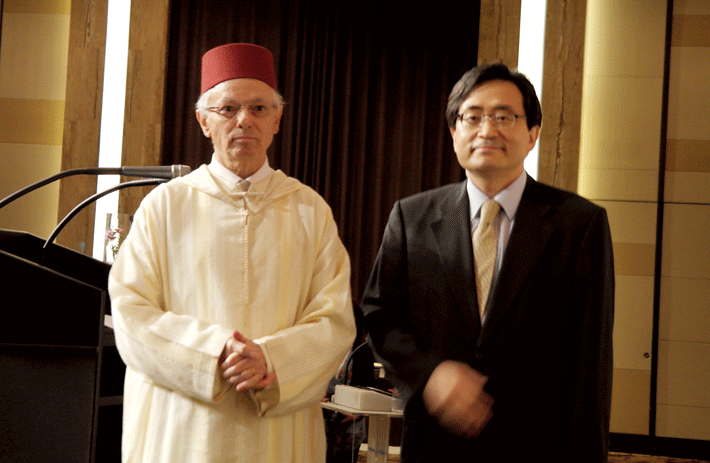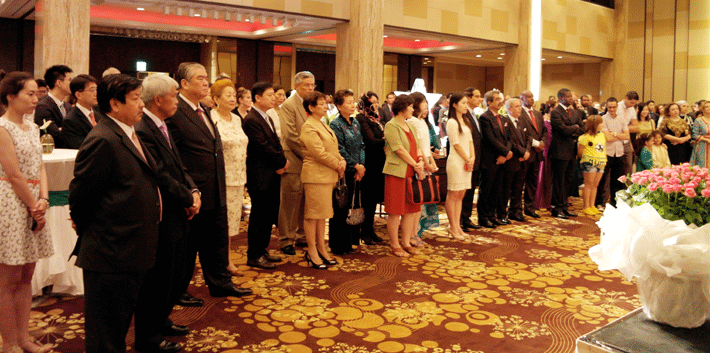PEOPLE & EVENTS
Morocco celebrates 14th Throne Day


Ambassador and Mrs. Mohammed Chraibi of Morocco hosted a reception at the Millennium Hilton Hotel in Seoul on July 31, 2013 to celebrate the 14th Throne Day of the Kingdom of Morocco.
There were many distinguished guests from Korean society and from the Seoul Diplomatic Corps and other segments of foreign community in Korea.
Among the Korean guests were Deputy Minister Shin Dong-ik of Foreign Affairs for Multilateral and Global Affairs, Chairperson Sun-Hyang Kim of the University of North Korean Studies, Chairperson Mrs. Kim Cho-won of the Women’s Volunteer Service Special Advisory Committee of Korean National Red Cross and Publisher-Chairman Lee Kyung-sik of The Korea Post.
Attendance from the SDC and other segments of foreign community was also very large, who included Ambassador Vitali V. Fen of Uzbekistan (dean of the Seoul Diplomatic Corps) and Ambassadors Mohammad Yunos Farman of Afghanistan, Hocine Sahraoui of Algeria, Dato Haji Harun Ismail of Brunei Darussalam, Grecia Fiodalicia Pichardo of Dominican Republic, Dibaba Abdetta (Dr.) of Ethiopia, Vishnu Prakash of India, Dato Ramlan bin Ibrahim of Malaysia, Kaman Singh Lama of Nepal, Shaukat Ali Mukadam of Pakistan and Mamadou Ndiaye of Senegal.
Speaking to the guests, Ambassador Mohammed Chraibi of Morocco said in part: “It is well known that Morocco has achieved remarkable development while also promoting democracy and reforms in important areas. In so doing, Morocco has contributed greatly to peace and stability in the region.” Excerpts follow:
It gives me great pleasure to welcome you at the Moroccan National Day and thank you for celebrating with the 14th Anniversary of the Enthronement of His Majesty the King Mohammed VI.

The celebration of the Throne Day is a long-standing tradition in Morocco where the monarchy institution has been, throughout centuries, the symbol of the continuity of the state, the guarantor of the national unity and the defender of spiritual values. Benefiting from a historical, popular and religious legitimacy, the Monarchy is the catalyst of openness, progress and modernity that characterize the Moroccan society.
Since the enthronement of His Majesty the King Mohammed VI in July 1999, my country has witnessed significant achievements reflected by the structural and comprehensive reforms initiated in the political, economic and social realms.
These reforms concern the adoption of strategic plans of development, the Family Code, the Equity and Reconciliation Commission, the National Initiative for Human Development and the advanced regionalization.
The process of political reforms culminated in the adoption by referendum, in July 2011, of a new Constitution affirming the principle of the separation of powers, the independence of justice, the strengthening of the respect of human rights and the granting of enlarged powers to the Head of government and to the parliament.
Hence, the singularity of the Moroccan model lies in the country’s ability to provide timely or even anticipatory political responses to movements of economic and social claims.
In the economic field, Morocco launched numerous strategic sectorial plans that ensure strong and sustainable economic growth. These plans are part of a process to speed up the development of vital sectors like agriculture, fishery, mining, renewable energy, tourism and logistics.
At the social level, Morocco has undertaken major reforms through (1) the National Initiative for Human Development meant to eliminate poverty illiteracy, (2) the establishment of the Equity and Reconciliation Commission to investigate past human rights violations and compensate the victims and (3) the adoption of a new Family Code to improve the status of women.

